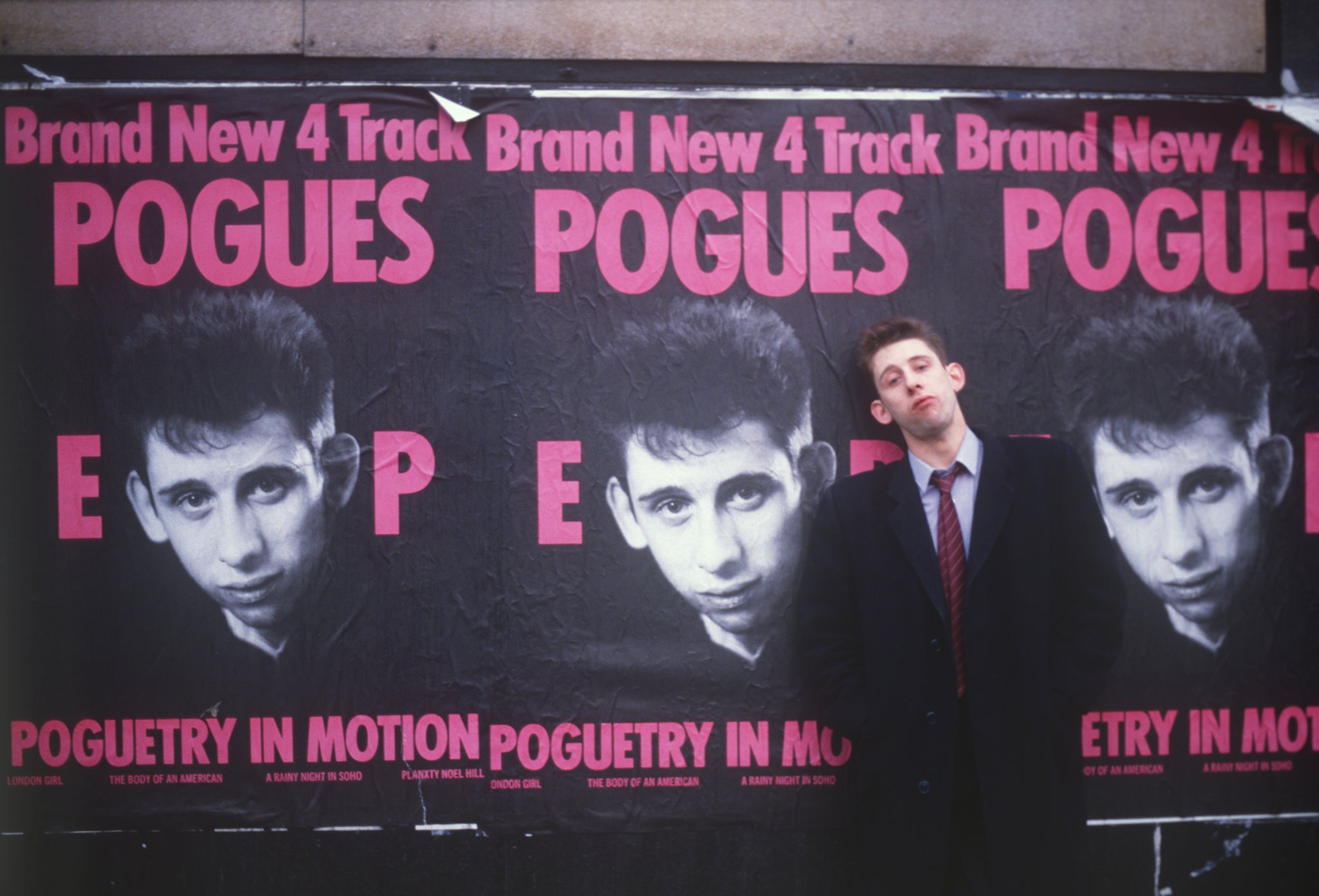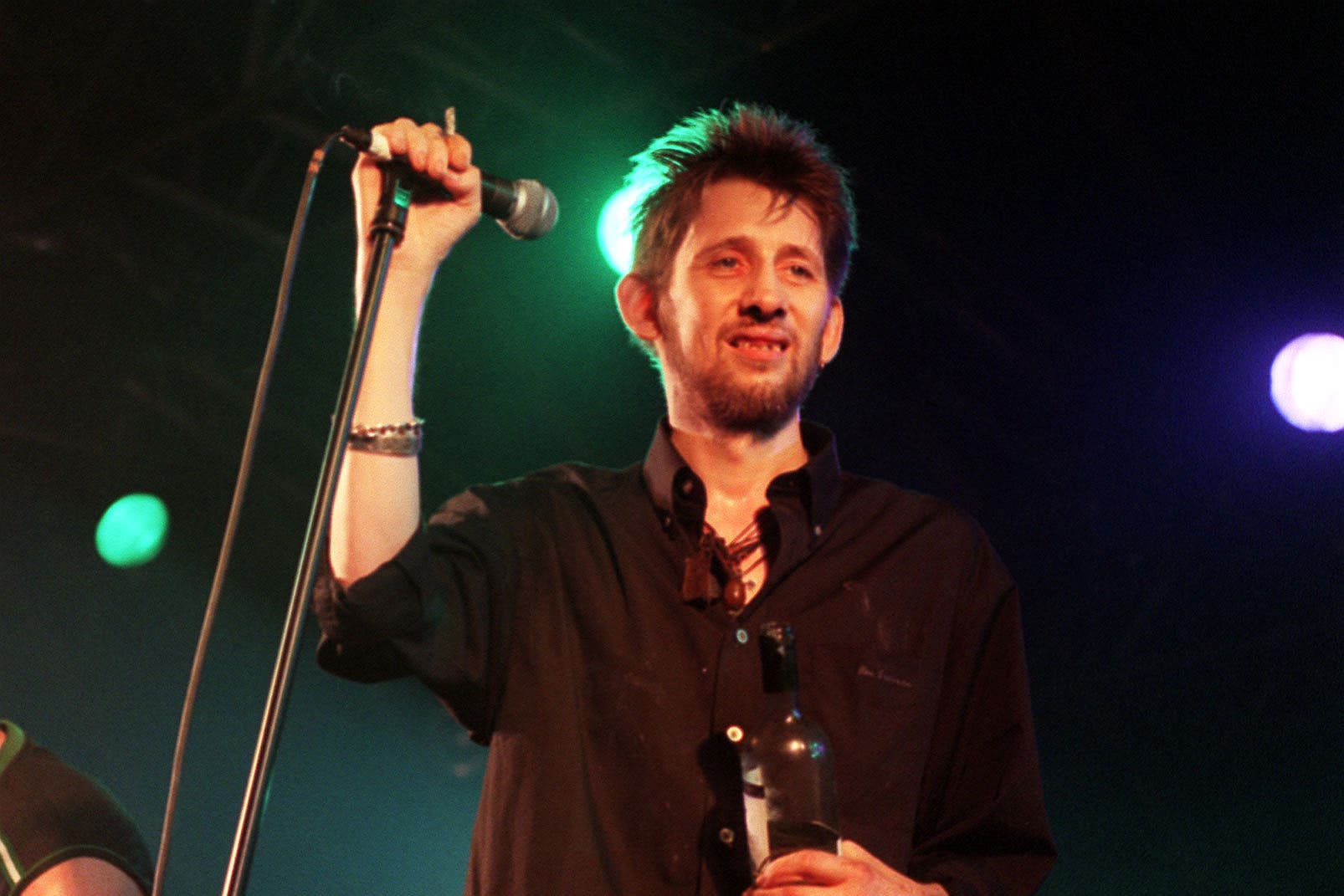The 10 best songs by The Pogues ranked
Shane MacGowan was never less than an enthralling voice, capable of whipping up the wildest jigs and soundtracking the saddest waltzes, writes Mark Beaumont. Here are his band’s greatest tracks, from ‘Fairytale of New York’ to ‘Dirty Old Town’

The world’s whiskey houses will be a-babble with tales of Shane MacGowan’s legendary – and often tragic – carousing this weekend, after the musician’s death aged 65. But in the background, on the nation’s speakers, jukeboxes and “drinking songs” playlists, a different story will be playing out. Of a historian, poet, social commentator and snarling romantic who revitalised Irish folk music for the post-punk age, documented the diaspora with sympathy, insight and unflinching honesty, and arguably helped redefine Ireland’s public image as the Troubles raged on.
Whether singing of love, death, the London gutter, the immigrant dream or long, long nights slumped over the bar, MacGowan was never less than an enthralling voice, capable of whipping up the wildest jigs and soundtracking the saddest waltzes. Here, in tribute, we gather The Pogues’ 10 greatest songs, and if you want to argue the toss, we’ll see you down Filthy’s and you’ll thank the Lord it’s payday.
10. If I Should Fall from Grace with God (1988)
The follow-up single to “Fairytale of New York” showed a refinement in The Pogues’ reeling, with a grace still very much evident in MacGowan’s lyrical desire to become absorbed into the proud Irish lineage once he’s gone boots-up. Of course, lines about wishing to be buried at sea or “let me go down in the mud where the rivers all run dry” take on added poignancy in the wake of his death, although if God likes the craic, he’ll be flinging the gates open for Shane.
9. Streams of Whiskey (1984)
It may be a little-known aspect of their character, but The Pogues liked a drink. The signs were all there early on: “Streams of Whiskey” sat at the heart of their 1984 debut album Red Roses for Me with a flagon of the hard stuff in one hand, a tin whistle in the other and this tale about getting hammered with Brendan Behan (in its dreams) falling from its grain-wetted lips. Behan’s imparted wisdom? That 15 pints are the answer to any problem. Legend.
8. Thousands Are Sailing (1988)
Paying tribute to the 12 million Irish immigrants processed through Ellis Island, and the thousands that never survived the sea crossing to New York, “Thousands Are Sailing” was among The Pogues’ most stirring tracks, narrated both by those who made new lives following in “Brendan Behan’s footsteps” and toasted their luck in “the land of opportunity … across the western ocean”, and those who didn’t make it out of their “coffin ship”.
7. A Pair of Brown Eyes (1985)
A masterpiece of MacGowan’s booze-hazy storytelling, the wonderfully maudlin yet hopeful waltz “A Pair of Brown Eyes” shifts between perspectives within the fine art of great modernist literature. Two sots at the bar swap sob stories about war, love and loss, the verses flowing together like a conversation lost to the night. By the early hours (or verse four) the city itself has joined its lovelorn yarn, a gorgeous post-traumatic flipside to Van Morrison’s “Brown Eyed Girl”.

6. Dirty Old Town (1985)
The urban grime was deeply engrained beneath MacGowan’s fingernails, and never more so than on The Pogues’ heartfelt, Celtic country cover of Ewan McColl’s 1949 tale of love and murder (or axe-based industrial espionage?) in the Salford wastelands. MacGowan inhabits “Dirty Old Town” like he was born, raised and sacked from the gasworks in it, and as a result the song now speaks of London and Dublin as much as the post-war Northern powerhouse powering down.
5. Fiesta (1988)
A wild polka twist on a carnival melody that Pogues founder Jem Finer heard at an Andalucian feast, “Fiesta” paid tribute to the city of Almeria as well as departing bassist Cait O’Riordan, and was to be the band’s last hit with MacGowan. The Pogues at their most celebratory, it would be adopted as the post-goal music by Celtic FC and become something of a signature tune for Harry Hill.
4. The Irish Rover (1997)
Great song, terrible cruise. The ferocious fatalism of The Pogues’ and The Dubliners’ take on this 19th-century reel has made it, to modern ears, the epitome of Irish traditional music. It certainly captures the raucous party below the decks of the grand ship, with a cargo list you might expect from an international export business launched by an Apprentice team – dogs, pigs, bones and rags – and its Coleridgian demise after seven disease-stricken years lost at sea, en route from Cork to New York. From his slurred snarl, you might think MacGowan had scuttled it himself when the seven million barrels of porter ran dry.

3. Fairytale of New York (1987)
Because Christmas isn’t an idyllic winter wonderland spent rocking around Christmas trees and meeting the love of your life on a dash for last-minute cranberries. It’s messy, boozy, argumentative, wistful, often spent partly in prison and, yes, a little bit romantic once the choirs kick in. Hence “Fairytale of New York” has become the most famous Pogues song and a festive mainstay, evoking the wide-eyed wonder of the Irish immigrant to New York and the redemptive beauty of a peace-making, if severely bruised and hungover, Christmas Day.
2. Sally MacLennane (1985)
With its pounding drums, trilling whistle and fervent fiddle, “Sally MacLennane” was one of the finest examples of MacGowan’s ability to build on and enhance the Irish traditional songbook. Enter Jimmy, harmonica hero of the world’s “greatest little boozer”, off to find his fortune with a belly full of brown. Sure, he drinks himself to death in the end, but what’s a little detail like that to stop the party? Your round.
1. A Rainy Night in Soho (1986)
Released on the 1986 EP Poguetry in Motion and retrospectively added to editions of Rum Sodomy & the Lash, “A Rainy Night in Soho” was arguably the definitive MacGowan gutter hymn. His regretful punk lilt shrouded in piano, tin whistle, cornet and strings, he roams the Soho streets in thrall to love or whiskey, depending on your interpretation of the “ginger lady” he wakes up beside each morning, and lines like, “We watched our friends grow up together/ And we saw them as they fell/ Some of them fell into Heaven/ Some of them fell into Hell.”






Join our commenting forum
Join thought-provoking conversations, follow other Independent readers and see their replies
Comments